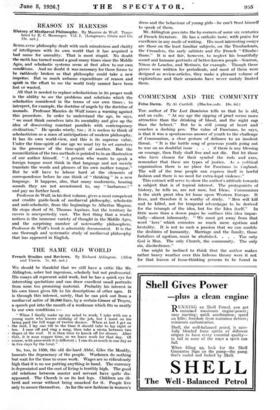REASON IN HARNESS
History of Mediaeval Philosophy. By Maurice de Wulf. Trans- lated by E. C. Messenger. Vol. I. (Longmans, Green and CO:
n0.)
SettoLaszic philosophy dealt with such minuteness and clarity of intelligence with its own world that it has acquired a bad name for unreality. That is most stupid. • No doubt the earth has turned round a good many times since the Middle Ages, and scholastic systems seem at first alien' to our own conditions. And no doubt it was necessary for those forms to be ruthlessly broken so that philosophy could take a new impetus'. But so much arduous expenditure of reason and spirit in the effort to see the world truly cannot have been lost or wasted.
All -that is needed to replace scholasticism in its proper rank is the 'ability to see the problems and Solutions which the schtdastics considered -in in the terms of our own tunes ; to interpret, for example, the doctrine of angels by the doctrine of monads. Professor Maurice de Wulf issues a warning against this procedure. In order to - understand the age, he says, " we must think ourselves into its mentality and give up the idea of discovering constant parallels with contemporary civilization." He speaks wisely, too ; it is useless to think of scholasticism as a mass of anticipations of modern philosophy. It has its own world-view, and this is its supreme value. Under the time-spirit of one age we must try to set ourselvei in the presence • of the time-spirit of another. But the reconciliation of the two methods is pointed to in an illustration of our author himself. - " A person who wants to speak a foreign tongue must think in that language and not merely translate -the words and phrases of his own mother tongue." But- he will have to labour hard at the elements of correspondence before lie can think of " thinking " in a new language. It happens, also, that many modernists, hearing sounds they are not accustomed to, say " barbarous ! " and pay no further heed.
Professor de Wulf, in his first volume, gives a most competent and erudite guide-book of mediaeval philosophy, scholastic and anti-scholastic, from the beginnings to Albertus Magnus. He stops short of St. Thomas Aquinas, but the territory he covers is unexpectedly vast. The first thing that a reader notices is the immense variety of thought in the Middle Ages, and the surprising number of noteworthy philosophers. Professor de 'Wulf s book is admirably documented. It is the one thorough and systematic study of mediaeval philosophy that has appeared in English. -










































 Previous page
Previous page